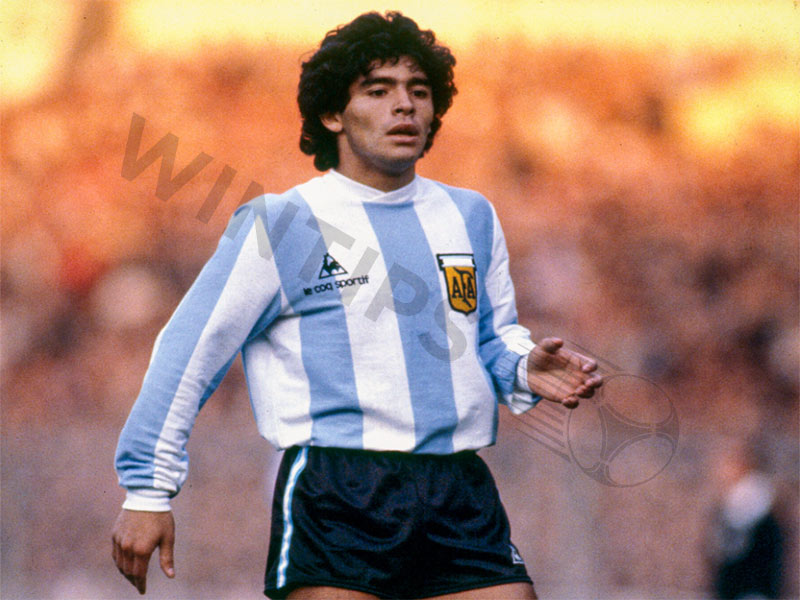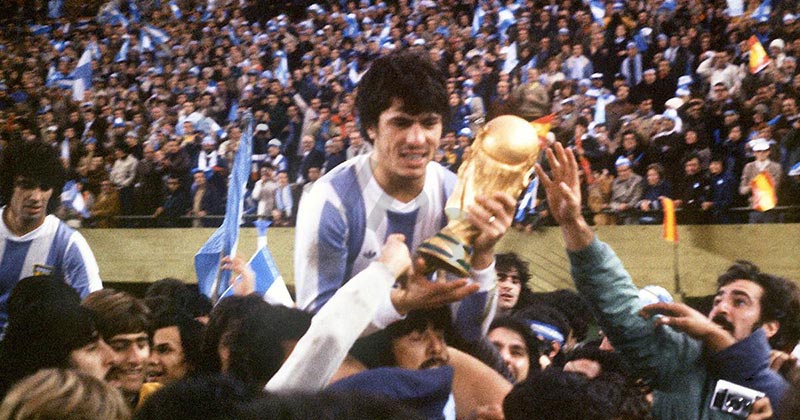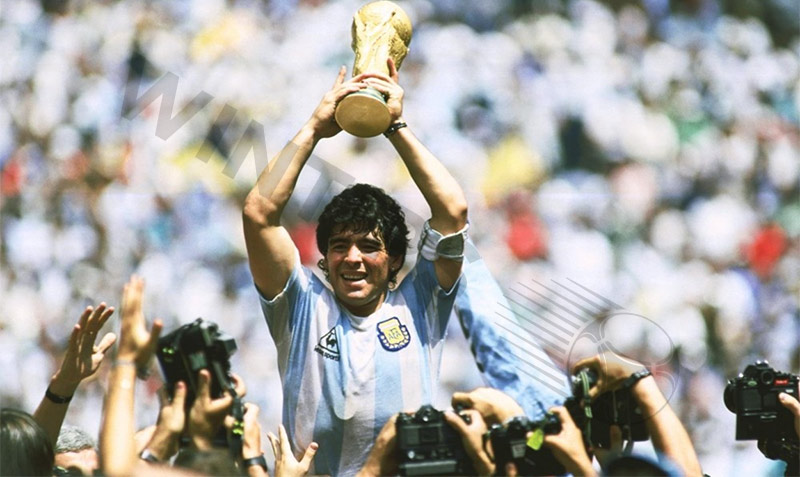Diego Maradona, one of the greatest football icons in history, is always remembered for his outstanding talent and dedication on the field. His glorious career is associated with historic moments, especially at the World Cup, where he left a deep impression. As a leader, Maradona helped the Argentine team overcome countless challenges to win the world championship. His contributions and memorable performances at the World Cup have become an endless source of inspiration for millions of fans, cementing his legendary position in the global football world. So how many World Cup trophies has Maradona won? Let's explore the details with Wintips through the article below.

Biography of famous football player Diego Maradona
Diego Maradona, born on October 30, 1960, in Villa Fiorito, Buenos Aires, Argentina, was renowned for his natural football talent from a young age. At 10, he joined the youth team Los Cebollitas, impressing with his dribbling skills and creativity. At 15, Maradona began his professional career at Argentinos Juniors, beginning his rise to football legend status.
In 1982, Maradona joined Barcelona, but his career there was marred by injuries and internal conflicts within the club. It was only after moving to Napoli in 1984 that he truly shone. Maradona led the Italian team to two Serie A titles and many other trophies, becoming an immortal symbol of Napoli.
On the international stage, he reached his peak at the 1986 World Cup in Mexico. He scored two historic goals in the quarterfinal against England: the "Hand of God" and the "Goal of the Century." Thanks to his brilliance, Maradona helped Argentina win the World Cup and was named the tournament's best player.
Despite his later career being overshadowed by injuries and scandals, Maradona remained an inspiration to millions of fans. After he died in 2020, he left behind an immortal legacy and was honored as one of the greatest players in football history.
How many World Cups did Maradona win?
Argentina has won three FIFA World Cups in its illustrious footballing history, behind only Brazil's five titles, and Germany and Italy's four each.
La Albiceleste won their first World Cup in 1978 as hosts. Their second victory came in 1986 when Diego Maradona led Argentina to glory in the World Cup hosted by Mexico. This tournament featured the famous "Hand of God" goal, which helped Argentina defeat England in the quarterfinals.
In the 2022 final, Argentina defeated France on penalties after a 3-3 draw in Qatar, a match considered one of the best in World Cup history.
1978 FIFA World Cup
As hosts, Argentina lifted the nation's first FIFA World Cup, with tournament top scorer Mario Kempes, who was playing for Valencia in Spain at the time.
As runners-up in the first group stage behind Italy, they overtook Brazil on goal difference in the second group stage, largely thanks to a 6-0 thrashing of Peru in the final match of the round. Kempes scored two of his six World Cup goals in that crucial match but was not done yet.

In the final against the Netherlands, Kempes opened the scoring in the 38th minute. Although the Netherlands responded in the 82nd minute to send the game into extra time, Kempes scored the winning goal in the 105th minute, securing a 3-1 victory and lifting the trophy. The match was marred by controversy as the Netherlands took issue with some of Argentina's delaying tactics during the game, but the hosts dominated.
1986 World Cup
The tournament, originally scheduled to be held in Colombia, was eventually relocated to Mexico due to financial issues in the South American country. Mexico was captivated by Diego Maradona, who shone in the tournament and led Argentina to World Cup glory.
A 1-1 draw with Italy was the only blemish of the group stage as Argentina topped Group A and advanced to the knockout stages. The Albiceleste defeated Uruguay and England in their first two knockout matches, both by one goal. The match against England became famous for the 'Hand of God' goal, in which Maradona jumped to head the ball into the net. However, the ball hit his hand and went into the goal, which was unseen by the referee, and the goal was awarded.
Maradona's brace helped Argentina overcome Belgium 2-0 in the semi-finals. Although the superstar failed to score in the final against Germany due to Lothar Matthaus's defending, his presence opened up space for his teammates. Maradona's stunning assist led to Jorge Burruchaga's 86th-minute winner, securing a 3-2 victory and claiming Argentina's second FIFA World Cup title.
2022 FIFA World Cup
Lionel Messi played a key role in Argentina's run to the final after a surprise 2-1 defeat to Saudi Arabia at the start of the tournament. He scored one goal and assisted another in a win over Mexico before a 2-0 victory over Poland, in which he missed a penalty, took them into the last 16. Messi guided Argentina past Australia and then the Netherlands (on penalties) before a stunning 3-0 win over Croatia in the semi-finals.

Messi's penalty opened the scoring against France in the final, and Angel Di Maria made it 2-0. However, Kylian Mbappe scored twice in a minute, sending the game into extra time. Mbappe again equalized Messi's goal in extra time, but Argentina would not be denied, winning 4-2 on penalties.
Diego Maradona's other achievements
In addition to the 1986 World Cup, Diego Maradona achieved many other notable feats during his career. At the club level, he led Napoli to two Serie A titles (1986–87, 1989–90), the 1988–89 UEFA Cup, and several other domestic trophies, cementing the team's status as an icon in Italy. Before that, at Barcelona, he won the Copa del Rey in 1983. Individually, Maradona received numerous prestigious awards, including the 1986 World Cup Golden Ball, and was twice voted South American Footballer of the Year (1979, 1980). After his playing career, he remained involved in football as a coach and was named "The Greatest Player of the 20th Century" by FIFA, alongside Pelé.
Conclusion
Diego Maradona, a football icon, won the World Cup during his illustrious career. He accomplished this at the 1986 FIFA World Cup in Mexico, where he led the Argentine national team to glory. With memorable performances, Maradona left an indelible mark on football history, including the "Hand of God" and the "Goal of the Century" in the quarterfinal against England. The victory in this tournament not only cemented his legendary status but also marked a significant milestone in the history of Argentine football. Maradona's journey at the 1986 World Cup remains a lasting source of inspiration for football fans around the world.







